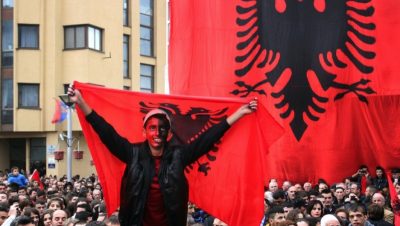North Macedonia Acknowledges Risk of Greater Albania Project

All Global Research articles can be read in 51 languages by activating the “Translate Website” drop down menu on the top banner of our home page (Desktop version).
Visit and follow us on Instagram at @crg_globalresearch.
***
For the first time, North Macedonian Prime Minister Zoran Zaev spoke publicly about the reality before them – a “Greater Albania” at the expense of North Macedonian territory. According to former North Macedonian diplomat, Risto Nikovski, Skopje has become aware of the danger that looms over the region. However, this is a warning that Greece, Serbia and Bulgaria have been giving for decades, but one that North Macedonia ignored as they instead prioritized NATO and European Union membership processes, as well as building a national identity and histography after the collapse of Yugoslavia in the early 1990s.
Zaev stated that a Greater Albania bears the risk for everyone as the Balkans is a small region. He condemned the propaganda of the project, adding that such ideas lead to wars.
“It is good that the Macedonian Prime Minister has become aware of that danger. In any case, all these ‘non-papers’ that appeared as if by chance, aim to feel the pulse of the region and what the reactions will be. It is clear that various intelligence services are doing ‘well’ in the Balkans and will continue to do so,” Nikovski said.
According to him, the Balkans is closely connected and everything that is happening in North Macedonia can affect Serbia and other regional countries.
“When there is no security in one of the countries, there is no security in the others, and that is the reality. In that context, the Greater Albania project is the biggest problem. This project is being seriously worked on and it can be said that about 70% has already been realized through the illegal separation of Kosovo from Serbia. Everything else is already part of the tactics because ‘Greater Albania’ will not mean the stabilization of the Balkans, but will lead to new conflicts and Albanian politicians having new ambitions,” he further warned.
Zaev’s warnings that Serbia as a state “is not safe” is true.
Serbia is the centre of the Balkans and the largest former Yugoslav country. Because of this, it is the main communication and security pillar for the region, and is positioning itself as an economic and transportation hub. If Serbia becomes unstable, then the repercussions of it will be felt across the entire Balkans.
With this in mind, Nikovski also warned that Serbia’s destabilization will inevitably lead to problems in North Macedonia, and “if Skopje is exposed to various influences and Bulgaria’s policy towards us continues, it will not lead to a positive direction.”
Officially, North Macedonia never identified a Greater Albanian project against their country. According to Nikovski, that reality is being realized everyday now. This makes it all the more interesting as it appears that North Macedonians are only coming to this realization after joining NATO in 2020 when their security was supposed to be more guaranteed as a result.
As Zaev highlighted, the fact that North Macedonia is in NATO does not mean that the Greater Albania idea is ended or abandoned. NATO of course is not a security guarantor, especially if we consider the decades long hostilities and near war scenarios between Greece and Turkey, including most recently (three times) in the summer of 2020, according to Greek Defense Minister Nikos Panagiotopoulos.
On the other hand, the U.S. and NATO are aware that if a serious conflict arises, Russia would surely be involved. For the West, they want to restrict Russian influence in the Balkans. A war situation may present Russia the opportunity to assert its influence more strongly in the region, just as it did in the South Caucasus following the 2020 Nagorno-Karabakh War. It is for this reason that although Albanians may have the goal of a Greater Albania, it is unlikely to find strong Western support if it is against countries already friendly to Atlanticist ambitions, such as Montenegro and North Macedonia.
Zaev also believes that the Greater Albania project will endanger Greece, and he believes that Athens does not see this danger and that it is only a matter of time before the problem will reach them. The North Macedonian Prime Minister however omits that neighboring countries were warning about this reality since the early 1990-s, but Skopje prioritized appropriating Greek and Bulgarian history as part of their nation building. Although North Macedonia abandoned their efforts to claim Greek history, including the legacy of Alexander the Great, with the signing of the Prespa Agreement in 2018, thus opening the country’s path towards NATO membership, its EU efforts are now being blocked by Bulgaria. Bulgaria highlights that the language of North Macedonia is a Western Bulgarian dialect, and the Slavic population of the country are indeed Bulgarians whose identities were changed during Marshall Tito’s Yugoslavia to prevent Bulgarian claims over the region.
The North Macedonian Prime Minister also believes that as soon as the EU slows down the integration process, some non-papers and other radical ideas, such as the Greater Albania one, will appear in the Balkans. He explained that when it comes to solving the Kosovo problem, everything that is acceptable for Belgrade and Pristina is good for Skopje – a solution that guarantees peace in the Balkans, European integration, security and the future of all ethnic communities living in that territory. But peace in the Balkans is still a distant prospect as Kosovo issue remains unresolved and the Greater Albania idea continues to be overwhelmingly popular among Albanians.
*
Note to readers: Please click the share buttons above or below. Follow us on Instagram, @crg_globalresearch. Forward this article to your email lists. Crosspost on your blog site, internet forums. etc.
Paul Antonopoulos is an independent geopolitical analyst.
Featured image is from InfoBrics

